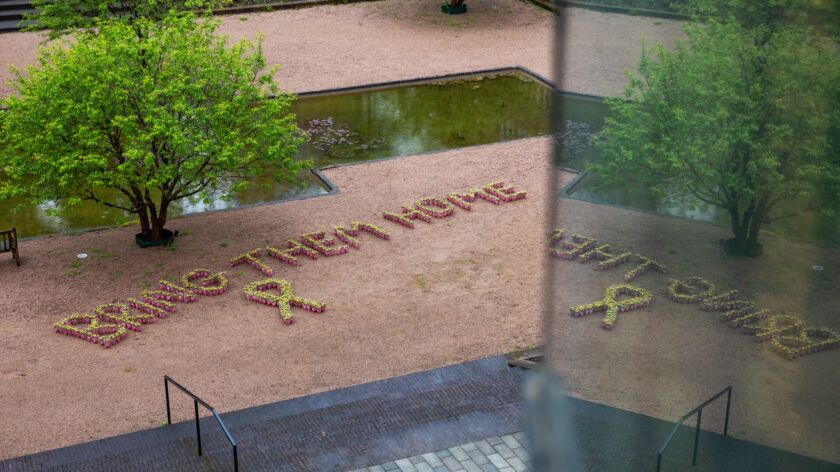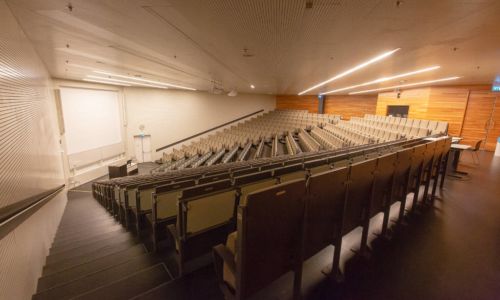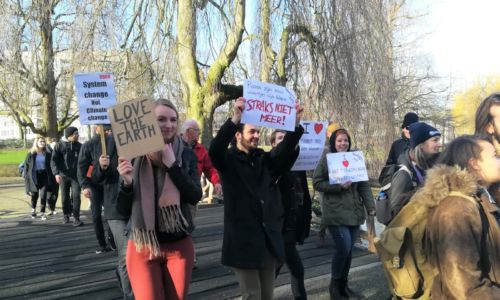Actievoerders tegen rector: ‘Advies om de banden met Israël te verbreken is eenzijdig’
-
 De boodschap die actievoerders bij het Berchmanianum plaatsten. Foto: Dick van Aalst
De boodschap die actievoerders bij het Berchmanianum plaatsten. Foto: Dick van Aalst
Voor er een beslissing komt over het wel of niet verbreken van de banden, gaat het college van bestuur van de Radboud Universiteit in gesprek met bestuurders van twee Israëlische partneruniversiteiten. Dat zei rector José Sanders vanochtend tegen een kleine groep actievoerders bij het Berchmanianum.
Bring Them Home. Die boodschap, doelend op de 59 Joodse gijzelaars die nog steeds vastzitten in de Gazastrook, plaatsten zeven studenten en medewerkers vanochtend omstreeks 08.30 uur met bloemen naast de vijver bij het Berchmanianum.
‘We willen een statement maken om de banden met Israëlische universiteiten niet te verbreken’, zegt student bestuurskunde Berdian Evink, die optreedt als woordvoerder van de groep. ‘Wij vinden het advies van de commissie internationale samenwerkingsverbanden, om de banden met Israëlische instellingen te verbreken, eenzijdig.’
‘Eenzijdig advies’
Dat advies, dat begin april werd gepubliceerd, luidde dat de Radboud Universiteit de banden met de Tel Aviv University en Hebrew University moet bevriezen, omdat die instellingen volgens de commissie ‘bijdragen aan ernstige en systematische mensenrechtenschendingen’.
De actievoerders die vanochtend de regen trotseerden, zijn het daar niet mee eens. Ook hekelen ze dat de discussiebijeenkomst over de samenwerking met Israëlische universiteiten al na een halfuur werd afgebroken. ‘Wij konden ons standpunt daar helaas niet duidelijk maken’, zegt Evink. ‘Vandaar deze actie.’
De actievoerders noemen het advies onzijdig omdat de adviescommissie geen gesprekken heeft gevoerd met de twee betrokken Israëlische instellingen. ‘Hoe kan je een goed advies geven als er geen contact mee is geweest?’, vraagt Evink zich af. ‘We vinden het belangrijk dat dat gebeurt.’
Ontoelaatbaar
Onder een rode Radboudparaplu liep rector José Sanders even later naar buiten, om naar de demonstranten te luisteren. Een van de actievoerders, die bij het Radboudumc werkt, vertelde dat hij in het verleden heeft samengewerkt met Israëlische universiteiten. ‘Dit zijn juist plekken waar de dialoog tussen Israëli’s en Palestijnen in ere wordt gehouden’, zei hij. ‘Daar lopen moslims, joden, christenen en anderen gewoon door elkaar. Daarom moeten we de banden niet verbreken.’
Een andere aanwezige zei dat het verbreken van banden met Israëlische universiteiten de negatieve gevoelens over Joden in Nederland zal versterken. ‘Als je met een kippa op je hoofd door de stad loopt, dan word je uitgescholden en dan wordt er soms zelfs geweld gebruikt. Dat zal alleen maar erger worden.’
Ingewikkelde afwegingen
Een andere actievoerder bracht in het heel belangrijk te vinden dat Tel Aviv University en Hebrew University op het advies kunnen reageren. In het rapport van de adviescommissie is zo’n weerwoord niet opgenomen. ‘Dat gebeurt ook’, beloofde Sanders. ‘We hebben eerder al reacties ontvangen op schrift van deze universiteiten, maar er wordt ook mee gesproken.’
De rector bedankte de demonstranten en zei de argumenten in te zullen brengen bij de andere leden van het college van bestuur. ‘Het zijn heel ingewikkelde afwegingen die we moeten maken. We hebben een heel krachtig advies gekregen en we zijn volop bezig om op een goede manier een afweging te maken, op basis van alle informatie die we krijgen.’
De beslissing van het college van bestuur wordt binnen enkele weken verwacht.




A. schreef op 24 april 2025 om 12:47
Allereerst lijkt dit een gesprek tussen partijen die al volledig in overeenstemming zijn, niet echt een ‘protest’ zoals StandWithUs het op hun instagram-pagina framed. Ik vrees dat dit gesprek gebruikt zal worden om een broodnodig besluit nógmaals (na 18 maanden genocide) voor zich uit te schuiven, waarin de betreffende Israëlische universiteiten genoeg ruimte voor wederhoor hebben, en ik betwijfel dat dergelijke gesprekken niet al regelmatig plaatsvinden. Tot slot wil ik benadrukken dat deze belangenorganisatie en andere zogenaamde pro-Israëlische ‘actiegroepen’ op Radboud door fundamentalistische Christenen worden georganiseerd en uiteindelijk de woordvoering consistent door niet-Joodse mensen wordt gevoerd. In schokkend contrast met de pro-Palestijnse bewegingen zoals het encampment, waar Joodse actievoerders trots met een watermeloen-kippa rondlopen, waar Joodse activisten onder naam en toenaam zichzelf hard maken vóór Palestijnen en tegen genocide. Als deze zogenaamde ‘bange, pro-Israëlische, Joodse student’ überhaupt bestaat, waarom horen we daar niets van?
Pro common sense schreef op 26 april 2025 om 20:14
Eeeh, misschien omdat hij bang is? Niet vreemd gezien all gemaskerde figuren. Of na wat er bv in Amsterdam gebeurd is. Je lijkt in deze kwestie namelijk niet ook maar enigszins enig tegengeluid te mogen laten horen. De hardste schreeuwers worden het meest gehoord. Het is een uiterst onacademische houding om de banden met universiteiten te verbreken. Daar is niks constructies of pro-wat-dan-ook aan.
Ju schreef op 24 april 2025 om 13:26
Een interessante lezing over de dubbele standaard in het verhaal over de gijzelaars. Het is niet de eerste keer dat de regering in Israël duidelijk is over haar bedoelingen. Hoe kunnen er ‘kanten’ en ‘neutraliteit’ zijn als we het over een genocide hebben?
https://www.haaretz.com/israel-news/2025-04-21/ty-article/.premium/israels-most-fanatic-cabinet-member-shares-the-inconvenient-truth-about-gaza-war/00000196-57b5-da35-a1d7-fff5b0db0000
medewerker schreef op 24 april 2025 om 13:58
Zou dat toevallig komen omdat de pro-palestina demo’s steeds vernielingen aanrichten en de çhappies’, zoals jij ze noemt demonstreren op een rustige, vriendelijkere manier dan de pro-palestina demo’s?
Ik heb de actievoerders van vanmorgen amper gehoord en me er niet aan geërgerd, terwijl de pro-palestina demo’s (op de laatste keer na) enorm veel kabaal maakten en steeds alles onderkladderden. Terwijl de actievoerders van vanmorgen hun statement met bloemen toonden.
Dat is toch wel een heel verschil . . .
Pepperoni schreef op 24 april 2025 om 14:03
Beste Zeer Ontsteld,
U bent zeker vergeten dat vorig jaar er wekenlang kampement gehouden mocht worden en gedemonstreerd. De politie kwam pas in een stadium dat er zaken vernield werden. Framing heet uw opmerking en daar is de wereld niet echt beter van geworden.
Dat gezegd hebbende: wat Israel uitvoert in Gaza is werkelijk buiten alle proporties, hoe vreselijk de aanleiding ook was, en elk westers land dat zaken doet, ook wetenschappelijke, met deze schurkenstaat heeft het bloed van lafheid, eigenbelang en 60.000 burgers aan zijn/haar handen.
Harry Pettit schreef op 24 april 2025 om 14:10
It is an absolute scandal that the Cvb is stalling making a decision yet again, despite jumping through all the hoops they set up themselves, hoops which have time and time again called for cutting ties in the strongest terms, they continue to find any way possible to delay. This ‘protest’ gathered 6 people, well done, a reminder that 1000 people signed a petition last year to cut ties (last year already), hundreds have participated in protests for 1.5 years demanding an ending of ties, and 80% of those who attended the session designed to discuss ties advocated for cutting them. As well as making us all complicit in genocide, the Cvb is anti-democratic. And then they wonder why students and staff escalate their protests.
We were told in May last year that the Cvb would have critical discussions with Israeli universities. Why did they wait until now for that? Further, have they ever ever reached out to a single Palestinian person or organisation to discuss why they find it so important for western institutions to boycott the institutions which stole their land and participate in their attempted erasure? The answer is they have not.
A couple of extra responses to things mentioned here:
1. Why would cutting ties with institutions complicit in genocide increase anti-semitism (you are making that connection time and again to spread fear)?
2. Are Palestinians in the occupied West Bank allowed to attend Israeli universities? Also, are Israeli universities based on land stolen from Palestinians? We also know the answer.
HR schreef op 24 april 2025 om 14:39
To answer your questions:
1. The answer is yes, your so-called anti-Zionism is a disguise for antisemitism. While it is theoretically possible to be anti-Zionist without being antisemitic, too often I see those anti-zionist protest also directing local jewish communities. Since october 7th anti semetic incidents have spike 89% in the Netherlands. Holocaust also started small with ‘kauft nicht von Juden’.
2. Actually, yes again, 16% of student on Hebrew university are Palestinians from the west-bank. And the land wasn’t stolen. Hebrew university was founded in 1925 under British mandate (no Palestina, actually, there hasn’t been an independend state or kingdom called Palestina in history at all, unless you would like to refer to the historical Philistines that lived only near the coast around Gaza). And it remained on mount Scopus even after the 1948 war, and before the Jordanian occupation of East Jerusalem ended in 1967.
Arjan schreef op 24 april 2025 om 18:12
So finally 6 people who use their brains, instead of 1000 who go along with the narrow-minded anti-Israel sentiment. Nowadays people hardly know anything about the history of the area that was called Palestine. I advise everyone to really delve into it before talking about ‘occupied territories’ and ‘genocide’. The only ones who are very openly out for genocide are Hamas. It is a disgrace to our Western norms and values that there is so much pro-Hamas and pro-Palestine sentiment and that sympathy for the only democracy in the Middle East, where there is cultural freedom and religious freedom, is so undermined.
Alumnus schreef op 25 april 2025 om 07:35
I fully support the two replies here. There are more people who think this way, without noise and activism.
A student schreef op 25 april 2025 om 09:59
Hi Harry, I am a student and a zionist. Can I take your lectures under my own name and assume that an exam of mine will be graded objectively by you?
Adriejan van Veen schreef op 25 april 2025 om 14:24
@Arjan: Well yes. Can I recommend Ilan Pappé’s “The Ethnic Cleansing of Palestine”? Or “The Biggest Prison on Earth: A History of the Occupied Territories”? Maybe Whalid Khalidi’s “All That Remains: The Palestinian Villages Occupied and Depopulated by Israel in 1948”? Or perhaps Rashid Khalidi’s “The Hundred Years’ War on Palestine”?
Arjan schreef op 25 april 2025 om 20:26
@Adriejan Thanks for your response. I do wonder why your book list is so one-sided. Ilan Pappe’s books are very controversial. He is clearly an anti-Zionist and has no objective judgment. The same goes for Rashid Khalidi’s book. The way they deal with source material is unfair. Dates are changed to make the story consistent, concepts are twisted or greatly exaggerated, atrocities of the Arabs are marginalized. You cannot see these works as objective and representative of this history. Benny Morris is certainly a renowned historian, but then I would rather recommend his ‘1948: A History of the First Arab-Israeli War’. Israel has of course made mistakes, like all countries in the history of mankind. But ask yourself in which society would you like to live? Our Western culture and also that of the state of Israel, based on tolerance, freedom, development. Or an Islamic culture, and therefore also the Palestinian culture, which is clearly very intolerant and violent.
Unfortunately, it is becoming increasingly clear that pro-Palestine sentiment is primarily driven by two evil forces: anti-Semitism and atheism. Or in other words, aversion to Judaism and Christianity. The role of Islam in this is particularly worrying, because it also seems to be a battle between Islam and the West. Take that group of screaming imams and their followers who have to vent their anti-Israel bile on Easter Sunday, a holiday for Christianity. In doing so, they demonstrate that they have absolutely no respect for our Western culture, and that is a very worrying development.
By the way, you should also read The Case for Israel by Alan Dershowitz. The book calls on readers to remain critical, but not automatically adopt the anti-Israel positions that are often presented as self-evident.
Henning schreef op 25 april 2025 om 21:37
I am neither a Zionist nor do I presume to really understand the situation of the Palestinians. But one thing is very clear to me from your comment: you don’t want to help the people in Gaza with your activism. You just want to be right and get right from the CvB. Otherwise, perhaps you would spend your time collecting donations for the victims in Gaza or making yourself actively useful in some other way. Shouting wildly and asking rhetorical questions doesn’t help anyone. Especially not the victims of genocide.
Jelmer schreef op 26 april 2025 om 07:41
@HR Confusion of antisemitism with anti-zionism is a deliberate strategy of Israël to discredit those that critique Israël. I don’t know where you got your 89% figure from (search for antisemitism + 89% does not give any results).
I would say that those that lived in Mandatory Palestine and their descendants are Palestinians. The immigration to Israel after the world wars is problematic on both sides. On the European side it was driven by lingering antisemitism, believing that Jews would never be safe here and were better off in their own land. On the Palestinian side the displacement of the Palestinians.
I think that a better course of action after the world wars would have been to work on incorporating Jews back into society. Return their wrongfully taken homes and businesses. Organize communal dinners with both Jews and non-Jews to create mutual understanding. Give everyone a say in policy and listen to each other. And while this is a hard path, it is the more worthwhile one.
And I believe we should do this today, as a solution to the conflict. Make sure that Jews are and feel safe and welcome in the places they emigrated from. Allow them to move back to any family/acquaintances that still live there. And as land in Israel and Palestinian territories becomes available, give it back to the Palestinians that once owned it. Along with reparations for their displacement. Work on community between the Palestinians and Jews. I know that’s hard work, but it is a solution that is not forced upon either party and achieves the goals of both sides – return of the Palestinians to their land and safety for Jews.
Arjan schreef op 26 april 2025 om 18:28
The works of Pappe and Khalidi cannot be seen as objective and representative of this matter. I recommend ‘The Case for Israel’ by Alan Dershowitz. The book calls on readers to remain critical, but not automatically adopt the anti-Israel positions that are often presented as self-evident.
Bevlogen Radboudiaan schreef op 24 april 2025 om 14:12
Komt onze Rector zomaar naar buiten? En weet ze ons weer te vertellen hoe moeilijk haar baan eigenlijk is? Geweldig, we zijn allemaal erg begaan met haar op wie deze enorme zware last drukt. Intussen hebben ze daar noch in Gaza noch in Israël geen ene sikkepit aan, trouwens in Nijmegen ook niet.
medewerker schreef op 24 april 2025 om 15:28
https://www.voxweb.nl/bericht/pro-palestijnse-actievoerders-veroorzaken-poeplucht-in-elinor-ostromgebouw-met-stinkende-vloeistof
Volgens mij zegt dit genoeg. Als mijn huis drie keer wordt beklad, bel ik de vierde keer ook de politie zodra ik ze aan zie komen lopen.
Palestinademonstranten hebben vanaf het eerste moment alleen maar ‘eisen’ gehad en zijn nooit in gesprek gegaan. Vervolgens zijn ze steeds een stapje verder gegaan en blijven ze maar treiteren, zie het andere voxweb bericht.
student schreef op 24 april 2025 om 15:30
dus als ik een essay over Trumps beleid schrijf moet ik eerst ook ff met hem in gesprek gaan zodat het niet te eenzijdig is?
Geert ter Horst schreef op 24 april 2025 om 16:26
Universiteiten maken geen buitenlands beleid. Dat is aan de overheid. Bovendien is het boycotten van Israëlische universiteiten niet in het Nederlands belang. Het wordt alleen ingegeven door goedkoop moralisme.
Arjan schreef op 26 april 2025 om 18:36
Waarom maakt iedereen zich toch vooral zo druk om de Palestijnen? Waar zijn de protesten tegen de genocide op christenen in Nigeria, of de genocide op de Alawieten in Syrie? Of de Oeigoeren in China? Waar zijn de protesten tegen de aanvallen op civiele doelen in Oekraïene? Kan iemand van de pro-palestijnse studenten die vraag eens beantwoorden?
Student FNWI schreef op 28 april 2025 om 16:06
Ik maak er geen onderdeel van uit, maar kan wel zeggen dat je argument whataboutism is.
Verder, die dingen die jij benoemt zijn inderdaad ook erg, maar vanuit een studentenprotest geldt er dat er wordt geprotesteerd tegen de banden met instellingen die bijdragen aan de genocide. Onze universiteit heeft (vanuit het overheidsbeleid) geen banden meer met Rusland, dus daar valt niet veel meer tegen te protesteren op onze campus. De banden met Nigeriaanse of Syrische organisaties die bijdragen aan genocide weet ik niets van af, hebben we die? Daarentegen hebben we nauwe banden met organisaties die direct de IDF helpen terwijl die dus genocide plegen.
Nogmaals, je bericht riekt naar whataboutism, maar zelfs dan gaan je vergelijkingen niet zo goed op. Als je vindt dat we elders banden hebben die ernstig zijn (zoals mogelijk China, al veronderstel ik dat daar ook naar wordt gekeken), stel ik voor dat je actie onderneemt, al heb ik het idee dat je daar geen voorstander van bent.